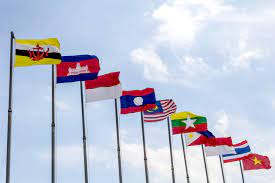Southeast Asia is set to become a major growth center in the coming years. This is supported by a new report from Standard Chartered Bank
"Global trade is increasingly shifting toward Asia as high-growth corridors emerge within the region and to new markets in Africa and the Middle East. The bloc of Southeast Asian countries that are part of ASEAN is obviously at the top of the list, with trade among the bloc's member states set to accelerate to nearly 9 percent annually over the next decade." Michael Spiegel, global head of Transaction Banking at Standard Chartered Bank, strongly argues this in a commentary published in the Business Times. "While these trends signal great opportunities, businesses are also facing a polycrisis, or a set of interdependent challenges, from rising geopolitical tensions, inflation and energy prices to the increasingly urgent need to address climate risks," Spiegel writes. According to the Standard Chartered Bank expert, "to succeed, companies must act now, connecting to new markets to diversify both sourcing and production to achieve more resilient supply chains. Sustainability is increasingly an imperative for both investors and consumers, making environmental, social and governance (ESG) compliance more urgent than ever, not only for corporations but also for their suppliers." Spiegel argues that "companies must balance growth objectives with resilient and sustainable supply chains. They need to identify and connect to growth opportunities, then execute a sustainable and resilient growth plan." The Standard Chartered Bank expert concludes by asking a precise question to which he proposes an equally precise answer: "So where will the growth hubs of the future be? We believe they will be in Asia, Africa and the Middle East, which are set to propel global exports from $21 trillion to $32.6 trillion by 2030, according to our new Standard Chartered Bank Future of Trade report."






